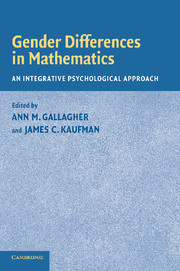Book contents
- Frontmatter
- Contents
- Preface
- Acknowledgments
- List of Contributors
- 1 Research on the Women and Mathematics Issue: A Personal Case History
- 2 The Perseverative Search for Sex Differences in Mathematics Ability
- 3 A Psychobiosocial Model: Why Females Are Sometimes Greater Than and Sometimes Less Than Males in Math Achievement
- 4 Gender Differences in Math: Cognitive Processes in an Expanded Framework
- 5 Cognitive Contributions to Sex Differences in Math Performance
- 6 Spatial Ability as a Mediator of Gender Differences on Mathematics Tests: A Biological–Environmental Framework
- 7 Examining Gender-Related Differential Item Functioning Using Insights from Psychometric and Multicontext Theory
- 8 The Gender-Gap Artifact: Women's Underperformance in Quantitative Domains Through the Lens of Stereotype Threat
- 9 “Math is hard!” (Barbie™, 1994): Responses of Threat vs. Challenge-Mediated Arousal to Stereotypes Alleging Intellectual Inferiority
- 10 The Role of Ethnicity on the Gender Gap in Mathematics
- 11 The Gender Gap in Mathematics: Merely a Step Function?
- 12 “I can, but I don't want to”: The Impact of Parents, Interests, and Activities on Gender Differences in Math
- 13 Gender Effects on Mathematics Achievement: Mediating Role of State and Trait Self-Regulation
- 14 Gender Differences in Mathematics Self-Efficacy Beliefs
- 15 Gender Differences in Mathematics: What We Know and What We Need to Know
- Author Index
- Subject Index
- References
5 - Cognitive Contributions to Sex Differences in Math Performance
Published online by Cambridge University Press: 05 June 2012
- Frontmatter
- Contents
- Preface
- Acknowledgments
- List of Contributors
- 1 Research on the Women and Mathematics Issue: A Personal Case History
- 2 The Perseverative Search for Sex Differences in Mathematics Ability
- 3 A Psychobiosocial Model: Why Females Are Sometimes Greater Than and Sometimes Less Than Males in Math Achievement
- 4 Gender Differences in Math: Cognitive Processes in an Expanded Framework
- 5 Cognitive Contributions to Sex Differences in Math Performance
- 6 Spatial Ability as a Mediator of Gender Differences on Mathematics Tests: A Biological–Environmental Framework
- 7 Examining Gender-Related Differential Item Functioning Using Insights from Psychometric and Multicontext Theory
- 8 The Gender-Gap Artifact: Women's Underperformance in Quantitative Domains Through the Lens of Stereotype Threat
- 9 “Math is hard!” (Barbie™, 1994): Responses of Threat vs. Challenge-Mediated Arousal to Stereotypes Alleging Intellectual Inferiority
- 10 The Role of Ethnicity on the Gender Gap in Mathematics
- 11 The Gender Gap in Mathematics: Merely a Step Function?
- 12 “I can, but I don't want to”: The Impact of Parents, Interests, and Activities on Gender Differences in Math
- 13 Gender Effects on Mathematics Achievement: Mediating Role of State and Trait Self-Regulation
- 14 Gender Differences in Mathematics Self-Efficacy Beliefs
- 15 Gender Differences in Mathematics: What We Know and What We Need to Know
- Author Index
- Subject Index
- References
Summary
This chapter offers an explanation, or a set of explanations, for how sex differences in cognitive abilities result in sex differences in math performance, and particularly differences in performance on high-level math tests. By high-level math tests, we mean tests such as the SAT-M, ACT-M, or GRE-M that are commonly used for competitive selection decisions. Our chapter is not about sex differences in math in general. Therefore, there are interesting differences between males and females in areas such as math self-concept, math anxiety, and so on that we do not discuss. We make this distinction because the general area of sex differences in mathematics is large, unwieldy, contradictory, and ultimately, in our opinion, not explainable by a common set of factors. We do, however, briefly examine some of the areas encompassed under the general topic of sex differences in mathematics because research in those areas serves to constrain explanations for sex differences in high-level math test performance. We now examine some of those areas of research.
GRADES IN MATH CLASSES
Reviews of the literature examining sex differences in math grades indicate that girls generally receive better grades than boys, especially after junior high school (Dwyer & Johnson, 1997; Kimball, 1989). Kimball concluded that junior high and high school girls received better grades than their male peers in specific courses and had a higher overall math grade point average.
- Type
- Chapter
- Information
- Gender Differences in MathematicsAn Integrative Psychological Approach, pp. 99 - 120Publisher: Cambridge University PressPrint publication year: 2004
References
- 1
- Cited by

